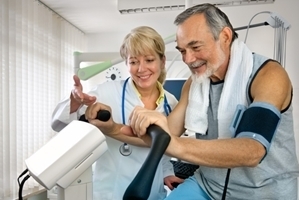As a travel nurse, you'll often see that lowering high cholesterol levels is a battle many patients face, and that fight is long from over. According to research from the U.S. Centers for Disease Control and Prevention, 12.1 percent of adults, or 1 in 8 people, experienced high cholesterol between 2011 and 2014. While this number is down from previous years, it still signals a need for greater heart-health education.
Healthy People 2020, an agenda created by the U.S. Department of Health and Human Services, aims to limit high cholesterol levels to just 13.5 percent of adults. Overall, that goal was met in the four-year increment listed above, but not every age group experienced such healthy results. The CDC noted that a whopping 16 percent of adults between the ages of 40 to 59 had high cholesterol. Meanwhile, 18.5 percent of total individuals had low high-density lipoprotein (HDL) cholesterol, which is considered "good" cholesterol.
Truly, the U.S. is on the right path to creating a nation of healthy hearts, and travel nurses can provide advice and resources to push this well-being initiative along. Here are some tips for lowering cholesterol levels:
Eat right
Beyond delivering excellent care, one of the main goals for travel nurses is to boost quality of life for patients. Part of that involves recommending diet changes, which often stems beyond just targeting all the necessary food groups. To be sure, healthcare professionals must cater diet suggestions to the patient's needs, and those with high cholesterol levels can benefit from heart-healthy foods.
Director of the Department of Nutrition at Brigham and Women's Hospital Kathy McManus told Harvard Medical School that people with high cholesterol levels should limit the amount of trans and saturated fats they consume.
"The first thing we do when I'm counseling patients is to go over all the sources of trans fats in their diet and make substitutions," McManus said.
Why are fatty foods so troublesome? Research has linked trans fats with heart disease, a frequent consequence of high cholesterol. In fact, the negative health effects of trans fat are so apparent that the use of this hydrogenated substance has been largely eradicated from the food industry. However, it's not completely gone. Trans fat can be found in packaged baked goods and fast food, so those with high cholesterol levels should stay away from these items.
In addition to eliminating fatty foods, these individuals may benefit from adding certain dietary elements that benefit the heart. Prevention listed several foods that may help naturally lower cholesterol. Take oats, for example. This easy breakfast food can reduce LDL by 5.3 percent in just six weeks. Salmon and other fish high in omega-3 fatty acids are also great for this purpose in addition to beans, tea, garlic and olive oil. Of course, fruits and vegetables are excellent options, too.
Travel nurses may be able to get more patients on board with healthy eating by having recipes or dinner ideas on hand that incorporate these cholesterol-lowering foods.
Get regular exercise
Physical activity provides an array of benefits, from elevating mood to staving off disease, and it can also lower cholesterol levels. At the same time, it can boost HDL cholesterol levels, according to the Mayo Clinic. Remind patients that they don't need to train for a marathon to experience the health benefits of working out. The Mayo Clinic noted that 10-minute increments of exercise throughout the day can help people manage their weight and heart health.
Need some motivation tools? Suggest patients buddy up with a friend or spouse when getting into the workout groove. A study published in the Annals of Behavioral Medicine found that doing aerobic exercises with a partner can actually improve performance levels. Plus, exercising is just more fun when you're doing it with a friend!
Travel nurses should ensure the patient's health is in good enough condition to start an exercise routine before making this suggestion.
Quit unhealthy habits
If patients need even more reason to quit smoking, explain how tobacco impacts their heart health. The Mayo Clinic explained that just 20 minutes without a cigarette can lower your heart rate and blood pressure to a healthier level, which is good news for your cholesterol. Of course, the longer patients go without cigarettes, the more advantages they'll experience. After 15 years of remaining cigarette-free, the risk for heart disease is comparable to that of a non-smoker.
Drinking alcohol is another lifestyle factor that can contribute to high cholesterol levels. While a glass of red wine can bring benefits to the heart, it's best to drink all alcohol in moderation.
Keep these tips in mind when providing advice on how patients can lower their cholesterol levels. A healthy combination of diet, exercise and lifestyle changes can go a long way in boosting overall well-being.

